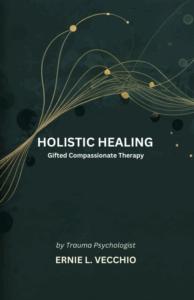
Holistic Healing
Gifted Compassionate Therapy
For decades, mental health treatment has revolved around symptom management, offering diagnoses that often leave individuals feeling fragmented rather than whole. Holistic Healing: Gifted Compassionate Therapy (GCT) presents a revolutionary alternative—one that shifts the focus from pathology to alignment, from suffering to intentional evolution.
Drawing on over 30 years of clinical experience, trauma psychologist Ernie L. Vecchio introduces a heart-centered, integrative approach that redefines healing. At the core of GCT lies the understanding that the human psyche is a self-corrective system—capable of realignment when freed from the distortions of trauma, egoic patterns, and spiritual gravity. Vecchio offers a compelling framework that both clinicians and seekers alike will find transformative:
- A Paradigm Shift in Healing – Moving beyond ego-driven therapy, GCT centers the heart as the true compass of human consciousness, revealing a pathway to profound clarity and reduced suffering.
- A New Lens on Psychological Reality – Instead of defining people by their diagnoses, GCT helps individuals reconnect with their authentic essence, moving from emotional fragmentation to integrated wholeness.
- A Dynamic Model for Intentional Evolution – Through structured techniques such as Observer Activation, Egoic Lens Mapping, and Heart-Centered Reframing, readers learn to access their natural self-corrective capacities.
This book is not just about therapy—it’s about reclaiming life as it was meant to be lived. Whether you are a clinician looking to deepen your practice or a reader on a personal journey of healing, Holistic Healing: Gifted Compassionate Therapy will change the way you view the human condition—and your own potential for transformation.
Bringing continuity to how this unfolds, we learn there are ten absolute truths of being human. The process begins with a logical and sensible path to emotional maturity – we are what happens first. All humans are spiritual beings born into a psychological world (first premise). You are human (second premise). Therefore, you are psychospiritual. In this context, giving station to what we are in the beginning means we no longer have to be at the mercy of a misguided ego. What follows is a reciprocal relationship with the self and all of life. More than reducing people to their strengths and weaknesses, Vecchio proposes that every human being is a hopeful expectation for the future. He reminds that the path forward has always been inward. Often called the road less traveled, he provides people with a pragmatic and reliable Map to Becoming.
He states, “Some have said that when the ego’s interference is removed, it is analogous to being able to see in the dark.” Offering people a clear understanding of ‘human angst’ he clarifies that we can learn to convert obstacles into motivational fuel. By giving station to our full navigational abilities, we become invigorated to live in the present moment. We become an inspiration for each other simply by the way we carry ourselves in the world. The meaningfulness of life returns when feelings and reason (a faculty of consciousness) are aligned. Often ignored, he proposes there is an evolving wisdom in our subjective experiences but we must have some form of an inner life to interpret them. Becoming a study of one, we develop a growing and dynamic perspective for the love of wisdom (i.e. philosophy), which brings this intelligence to the surface. What follows is a natural inclination to pay it forward. Having a clear understanding of the past and a deep appreciation for the present, we develop an optimistic view of the future. True authenticity is the simultaneous realization of hindsight, insight, and foresight, a form of vision that is proof-positive of a life lived awake.
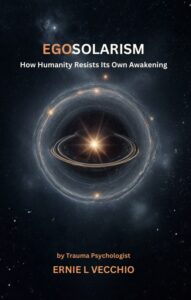
Egosolarism
How Humanity Resists Its Own Awakening
Egosolarism: How Humanity Resists Its Own Awakening is the necessary sequel to Galileo’s Unfinished Lesson by trauma psychologist Ernie L. Vecchio—a continuation of a conversation that began with the radical idea that we’ve misplaced the true center of our inner universe. Where Galileo’s Unfinished Lesson revealed how humanity once resisted a literal shift in perspective, Ego-solarism explores the psychological and spiritual refusal to do the same within ourselves. This book does not offer comfort. It offers clarity. It does not promise transcendence—it invites remembrance. Drawing from decades of clinical insight and spiritual reflection, Vecchio examines the gravitational illusion that has kept human consciousness locked in orbit around the ego, mistaking struggle for meaning and separation for truth. Told through poetic unfolding, thought experiments, and a steadily building arc of understanding, Ego-solarism challenges us to see that our suffering is not the condition of life—it is the consequence of resisting it. It speaks to a world on the verge of passing its dysfunction to the next intelligence, and asks the urgent question: If we do not awaken now, what will awaken in our place? More than a sequel, this is a reckoning. A final invitation to return the heart to its rightful place—not just as a feeling center, but as the compass for a humane universe. Because the question is no longer whether awakening is possible. It’s whether we are willing to stop resisting it.
Bringing continuity to how this unfolds, we learn there are ten absolute truths of being human. The process begins with a logical and sensible path to emotional maturity – we are what happens first. All humans are spiritual beings born into a psychological world (first premise). You are human (second premise). Therefore, you are psychospiritual. In this context, giving station to what we are in the beginning means we no longer have to be at the mercy of a misguided ego. What follows is a reciprocal relationship with the self and all of life. More than reducing people to their strengths and weaknesses, Vecchio proposes that every human being is a hopeful expectation for the future. He reminds that the path forward has always been inward. Often called the road less traveled, he provides people with a pragmatic and reliable Map to Becoming.
He states, “Some have said that when the ego’s interference is removed, it is analogous to being able to see in the dark.” Offering people a clear understanding of ‘human angst’ he clarifies that we can learn to convert obstacles into motivational fuel. By giving station to our full navigational abilities, we become invigorated to live in the present moment. We become an inspiration for each other simply by the way we carry ourselves in the world. The meaningfulness of life returns when feelings and reason (a faculty of consciousness) are aligned. Often ignored, he proposes there is an evolving wisdom in our subjective experiences but we must have some form of an inner life to interpret them. Becoming a study of one, we develop a growing and dynamic perspective for the love of wisdom (i.e. philosophy), which brings this intelligence to the surface. What follows is a natural inclination to pay it forward. Having a clear understanding of the past and a deep appreciation for the present, we develop an optimistic view of the future. True authenticity is the simultaneous realization of hindsight, insight, and foresight, a form of vision that is proof-positive of a life lived awake.
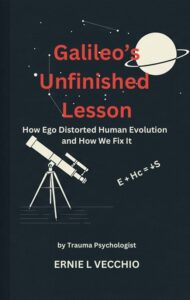
Galileo’s Unfinished Lesson
How Ego Distorted Human Evolution and How We Fix It
What if humanity’s greatest burden isn’t fate, but a correctable error in perception?
Four centuries ago, Galileo’s revolutionary discovery that Earth isn’t the center of the universe triggered scientific advancement but left human psychology unchanged. We accepted a sun-centered cosmos yet maintained ego-centered identities, creating what trauma psychologist Ernie L. Vecchio calls “ego-solarism”—a fundamental misalignment that generates unnecessary suffering.
Drawing on decades of clinical work with thousands of trauma patients, Vecchio reveals how this distortion creates “spiritual gravity”—the artificial weight we feel when ego falsely assumes the center position meant for the heart.
With clarity and compassion, Vecchio introduces a revolutionary framework for measuring alignment between ego and heart. He offers compelling evidence that the psyche, like the body, is designed to self-correct when interference is removed—what he calls “intentional evolution.” The result is a healing algorithm that explains why suffering increases when ego dominates and decreases when heart leads.
As humanity faces unprecedented challenges—political polarization, environmental crisis, AI development, and an epidemic of meaninglessness—completing Galileo’s unfinished revolution has never been more urgent. This book doesn’t ask us to adopt new beliefs but to recognize what has always been true: the heart, not the ego, was meant to be our center.
Both a Diagnosis and a Cure! Galileo’s Unfinished Lesson is a roadmap for our collective transition from ego-solar existence to heart-centered awareness. It offers not just hope for a better future but evidence that alignment, not struggle, is our natural state. The great shift isn’t coming—it’s waiting for us to see what has been in front of us all along.
Bringing continuity to how this unfolds, we learn there are ten absolute truths of being human. The process begins with a logical and sensible path to emotional maturity – we are what happens first. All humans are spiritual beings born into a psychological world (first premise). You are human (second premise). Therefore, you are psychospiritual. In this context, giving station to what we are in the beginning means we no longer have to be at the mercy of a misguided ego. What follows is a reciprocal relationship with the self and all of life. More than reducing people to their strengths and weaknesses, Vecchio proposes that every human being is a hopeful expectation for the future. He reminds that the path forward has always been inward. Often called the road less traveled, he provides people with a pragmatic and reliable Map to Becoming.
He states, “Some have said that when the ego’s interference is removed, it is analogous to being able to see in the dark.” Offering people a clear understanding of ‘human angst’ he clarifies that we can learn to convert obstacles into motivational fuel. By giving station to our full navigational abilities, we become invigorated to live in the present moment. We become an inspiration for each other simply by the way we carry ourselves in the world. The meaningfulness of life returns when feelings and reason (a faculty of consciousness) are aligned. Often ignored, he proposes there is an evolving wisdom in our subjective experiences but we must have some form of an inner life to interpret them. Becoming a study of one, we develop a growing and dynamic perspective for the love of wisdom (i.e. philosophy), which brings this intelligence to the surface. What follows is a natural inclination to pay it forward. Having a clear understanding of the past and a deep appreciation for the present, we develop an optimistic view of the future. True authenticity is the simultaneous realization of hindsight, insight, and foresight, a form of vision that is proof-positive of a life lived awake.
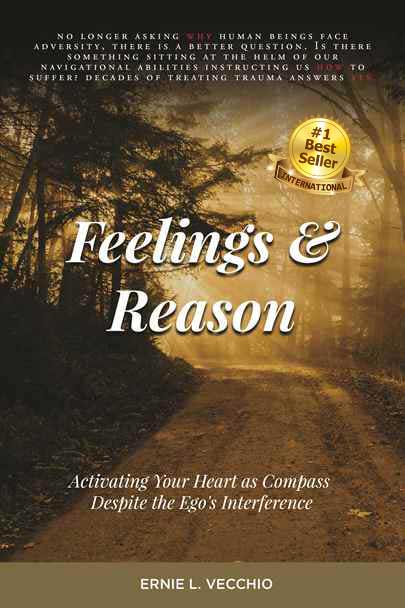
FEELINGS & REASONS
Activating Your Heart As Compass Despite The Ego’s Interference
Learn from a trauma psychologist the wisdom of real people challenged with the task of overcoming severe adversity. Integrating their insights into a complete picture of the human experience Ernie L. Vecchio reveals a developmental understanding of how adversity becomes an opportunity for self-correction, growth, and healing. By acknowledging that the human ego is only one-third of a larger system, people learn not only what is observing their life, but why and where it is intending for them to go. The problem is we’re stuck in between life as it is and life as intended with whatever the ego considers interference. But there is good news, a unifying intelligence within everyone that wants nothing more than to liberate our fullest expression.
Bringing continuity to how this unfolds, we learn there are ten absolute truths of being human. The process begins with a logical and sensible path to emotional maturity – we are what happens first. All humans are spiritual beings born into a psychological world (first premise). You are human (second premise). Therefore, you are psychospiritual. In this context, giving station to what we are in the beginning means we no longer have to be at the mercy of a misguided ego. What follows is a reciprocal relationship with the self and all of life. More than reducing people to their strengths and weaknesses, Vecchio proposes that every human being is a hopeful expectation for the future. He reminds that the path forward has always been inward. Often called the road less traveled, he provides people with a pragmatic and reliable Map to Becoming.
He states, “Some have said that when the ego’s interference is removed, it is analogous to being able to see in the dark.” Offering people a clear understanding of ‘human angst’ he clarifies that we can learn to convert obstacles into motivational fuel. By giving station to our full navigational abilities, we become invigorated to live in the present moment. We become an inspiration for each other simply by the way we carry ourselves in the world. The meaningfulness of life returns when feelings and reason (a faculty of consciousness) are aligned. Often ignored, he proposes there is an evolving wisdom in our subjective experiences but we must have some form of an inner life to interpret them. Becoming a study of one, we develop a growing and dynamic perspective for the love of wisdom (i.e. philosophy), which brings this intelligence to the surface. What follows is a natural inclination to pay it forward. Having a clear understanding of the past and a deep appreciation for the present, we develop an optimistic view of the future. True authenticity is the simultaneous realization of hindsight, insight, and foresight, a form of vision that is proof-positive of a life lived awake.
WHAT READERS ARE SAYING
Ernie details the evolution of a disconnect between our hearts and minds, information that is paramount to understand for those people interested in personal and professional development. He offers an existential compass for each of us to use along life’s journey.
As a trauma psychologist, Ernie has counseled many people with severe psychological problems. He describes in heartwarming fashion how he enabled them to move toward more fulfilling lives. I particularly liked how his ‘frequently asked questions’ addressed people’s challenges and concerns, providing the reader with valuable insights. I enjoyed and recommend this book.
Ernie, great book. The question: “How is it we can substitute what is truly in our hearts for what is falsely in our heads?” resonated with me so powerfully and was a revelation. Thank you! My yoga instructor often talks about “the illusions we tell ourselves.” They suggest If we could just get out of our heads and lead with our intuitive hearts, our ability to see and feel would be so healing.
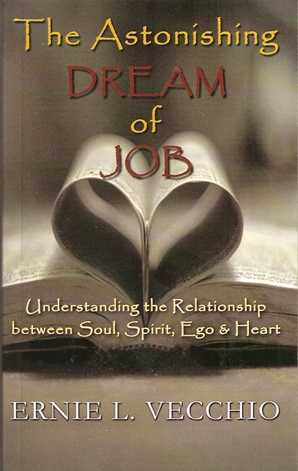
ASTONISHING DREAM OF JOB
Understanding The Relationship Between Soul, Spirit, Ego & Heart
At a time when the collective soul has grown weary of the question why, this modern reimagining of the ancient story of Jōb invites us into a deeper understanding of what it means to suffer—and to awaken.
When a long-lost twelfth-century artifact resurfaces, its value is not found in the pottery itself, but in the hidden manuscript sealed within its walls. What emerges is a radical reinterpretation: the story of Jōb was not a historical event, but a dream—one born from the psyche’s struggle to make meaning out of internal chaos.
Through the lens of this newly uncovered text, old friends Pieta and Lou embark on a journey that blends history, myth, and psychological truth. As they explore the dream’s symbolism, they uncover insights long buried: that suffering is not punishment, but passage. That love—true self-love—is not narcissism, but necessity. And that the human soul, spirit, ego, and heart are not isolated traits, but parts of a single, living system, activated through the crucible of adversity.
The Astonishing Dream of Jōb offers readers not just a story, but a shift in perspective—a chance to revisit the timeless question of suffering with new eyes and an open heart.
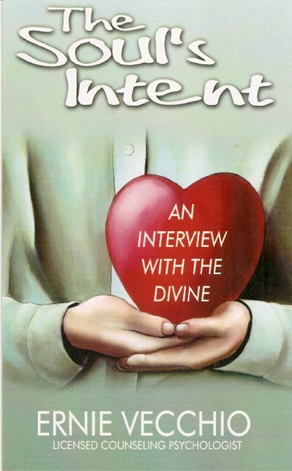
THE SOUL’S INTENT
An Interview With The Divine
Most of us assume we arrive when we’re born. But what if we don’t truly arrive until we choose to be here?
In The Soul’s Intent, trauma psychologist Ernie L. Vecchio offers a profound shift in perspective—spiritual maturity is not bestowed by time or belief, but earned through the struggle to be fully present. This book is an invitation to awaken not only to the now, but to the deeper truth that presence is a choice—one the soul has been waiting for us to make.
With clarity and compassion, Vecchio explores the symbiotic relationship between the ego, emotions, and soul—revealing how this triad works through metaphor, tension, and symbol to guide us toward healing. Through a unique question-and-answer format, readers are led step-by-step through a process of self-discovery that builds a bridge between the emotional and the spiritual, recovering intimacy, forgiveness, and ultimately restoring the inner life.
More than a roadmap, The Soul’s Intent is a lens—a way of seeing ourselves as both wounded and whole. It reminds us that suffering is not the enemy of spiritual growth, but its initiator. And that life begins, in earnest, when we stop running from our story and instead choose to stand inside it.
This is not just a book for seekers—it is a guide for those ready to arrive.
When a valuable piece of twelfth-century pottery resurfaces, it’s discovered that the real treasure lies hidden within its walls in the form of an ancient text. Reimagining the biblical story of Job not as a real event, but rather as a dream stemming from Job’s reaction to internal stress, the text has the potential to change how human beings relate to suffering.
Longtime friends Pieta and Lou glean profound insights from the text. Though love is the ultimate and highest goal to which humans can aspire, the text sheds light on a distortion about self-love—the one that says that loving oneself is narcissistic. This is a belief that ultimately only hinders the universal quest for self-love. Pieta and Lou discover the text’s final message: that soul, spirit, ego, and heart have a symbiotic relationship that is only known through transformative suffering.